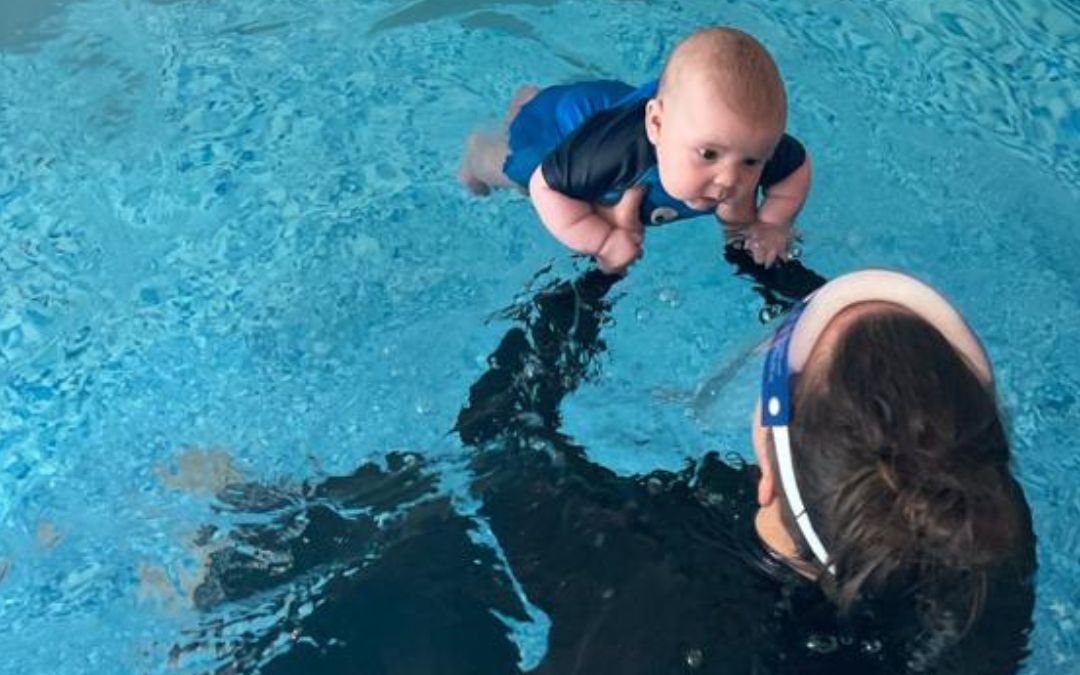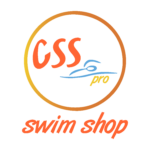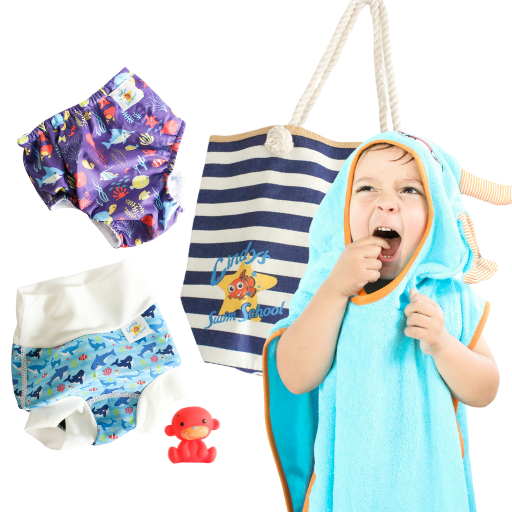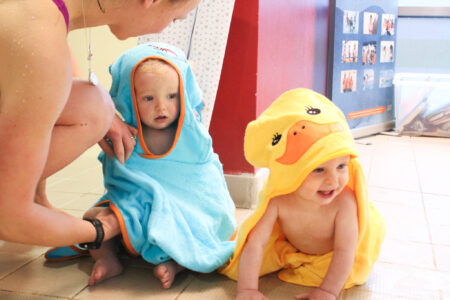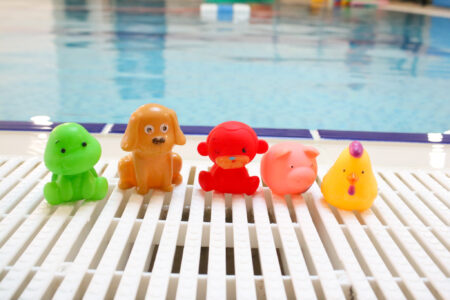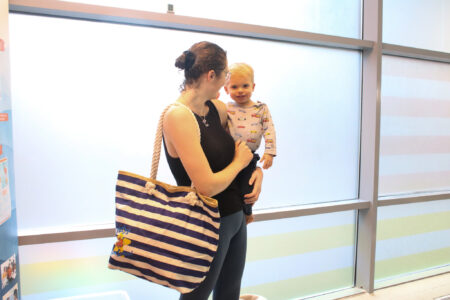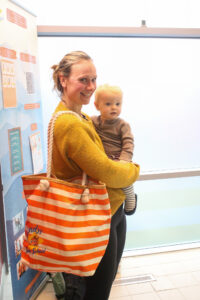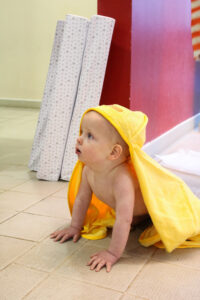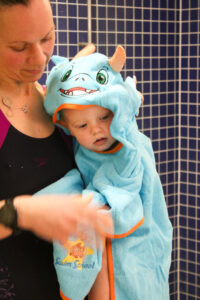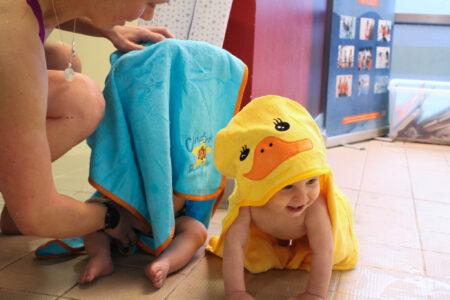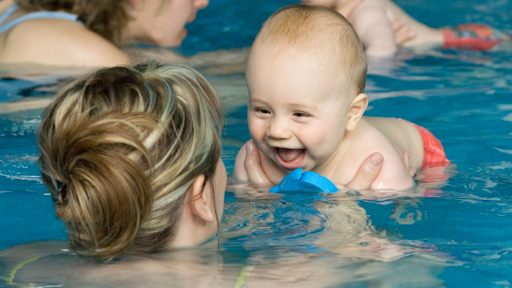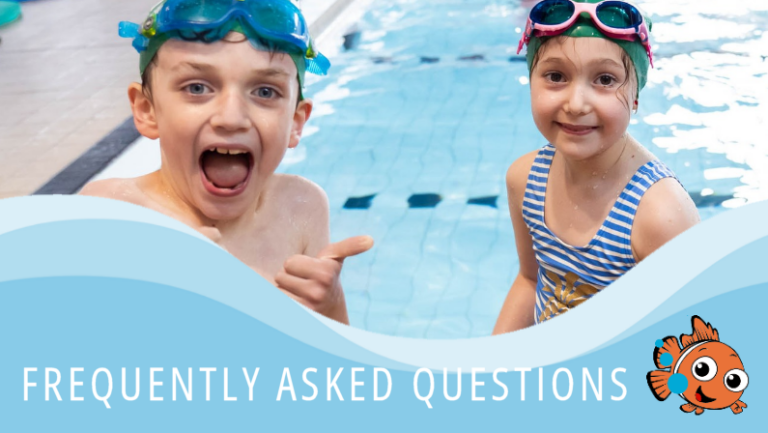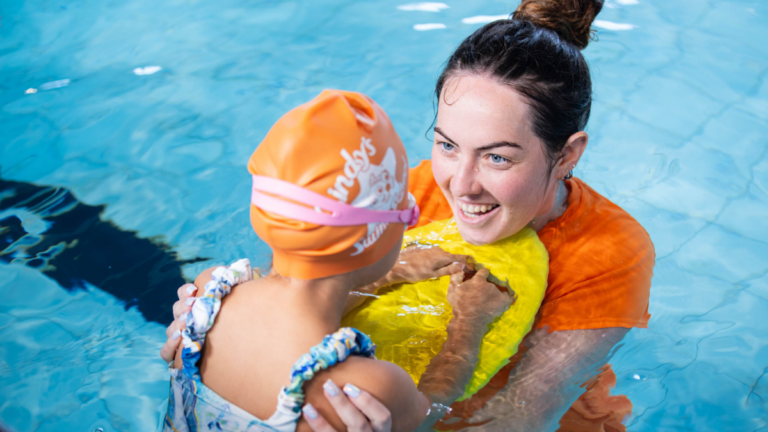Are you wondering whether you can take a newborn to baby swimming classes?
You may be surprised to learn that babies can enjoy the water as a newborn and there are countless benefits to starting early. From stretching limbs to building muscle and coordination to creating special bonding moments, baby swimming is an amazing experience for parents, carers and their babies.
In this article, we’ll dive into everything you need to know about introducing your newborn to the pool. We’ll cover essential safety tips, what to wear, and even fun games to play. Get ready to discover the joy of swimming with your little one!
Frequently Asked Questions about Newborn Swimming Classes
Click the question to jump to our answer!
- Can newborn babies go to swimming classes?
- Can newborns swim in chlorinated pools?
- What should newborns wear when swimmming?
- Should I use a newborn swim float?
- How should I hold my baby in the pool?
- What are the benefits of taking a young baby swimming?
- Top tips when taking a young baby to their first swimming class
Can Newborn Babies Go to Swimming Classes?
In a word, yes! Babies can go swimming at any age. NHS guidance states that babies don’t have to wait until after their immunisations before they can swim. It is advised that parents with babies who are born prematurely liaise with their doctor before they head to the pool.
Mothers are generally advised to wait until after their 6-week postpartum check-up before swimming themselves. However, there’s no reason another family member can’t take the baby to the pool before then. So, dads, why not grab your swimming trunks and have some fun with your little one in the pool!
A few things to think about before you take your newborn to the water
Newborn babies are more sensitive to temperature changes, as they cannot regulate their body temperature as well as adults. So, check with the pool before booking that the water temperature in the pool is warm, 32C for babies under 3 months. Cold water can quickly lower a baby’s body temperature, leading to hypothermia.
It is also important to keep the swimming sessions short initially (20 minutes) and gradually increase the time as the baby becomes more comfortable in the water.
Can newborns swim in chlorinated pools?
Chlorine can make skin a little dry. To help prevent skin dryness, thoroughly rinse your baby with cool fresh water after swimming and apply a baby moisturiser.
If your baby does have a skin condition, it’s important to moisturise with a non soluble cream to create a boundary between the skin and water before swimming. Vaseline is great and using a swim suit with full arms and legs on top of 2 swim nappies can help.
What should newborns wear when swimming?
When taking a newborn swimming, it’s important to choose the right swimwear and accessories to ensure their comfort, safety, and hygiene. Here are some recommendations:
Swim Nappies are Essential!
There are both disposable and reusable options available. Disposable swim nappies designed for use in the water are available at most supermarkets. Alternatively, you can purchase a reusable swim nappy, made from super soft neoprene. These are also more environmentally friendly 🙂
At Cindy’s we require all babies to use a swim nappy and a neoprene baby swim nappy, which goes over the swim nappy ensuring there are no accidents in the pool! Here’s a link to the reusable swim nappies and neoprene swim nappies that we use. These nappies are supposed to be tight, so that if your newborn has a no.2 in the water, the nappies catch it before it goes in the water.
You can purchase these items online from Cindy’s Swim Shop.
Neoprene swim nappy
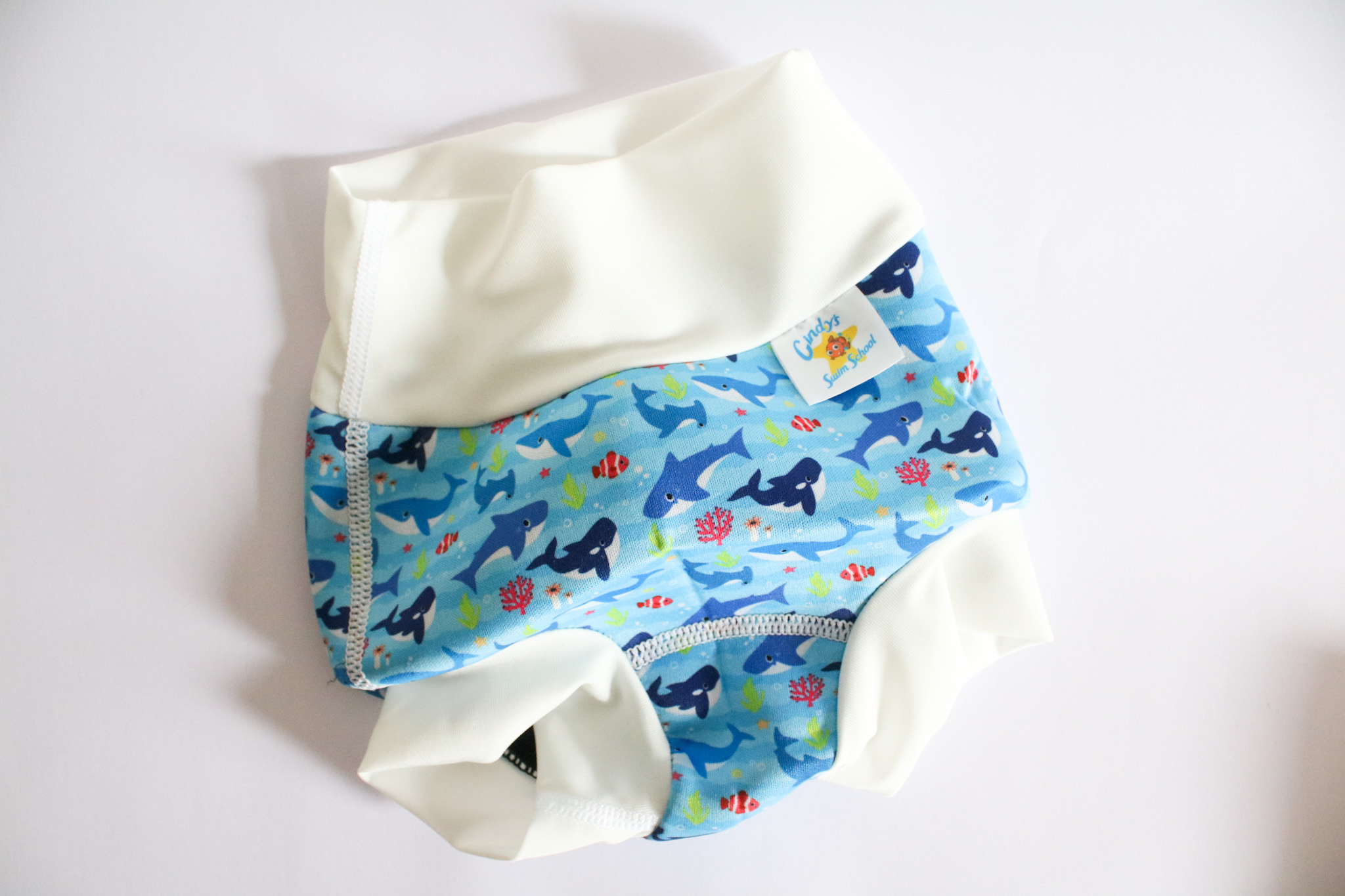
Both a neoprene swim nappy and a reusable swim nappy are required for each lesson. Wear the neoprene swim nappy over the top of a swim nappy.
£10.00
Reusable swim nappy
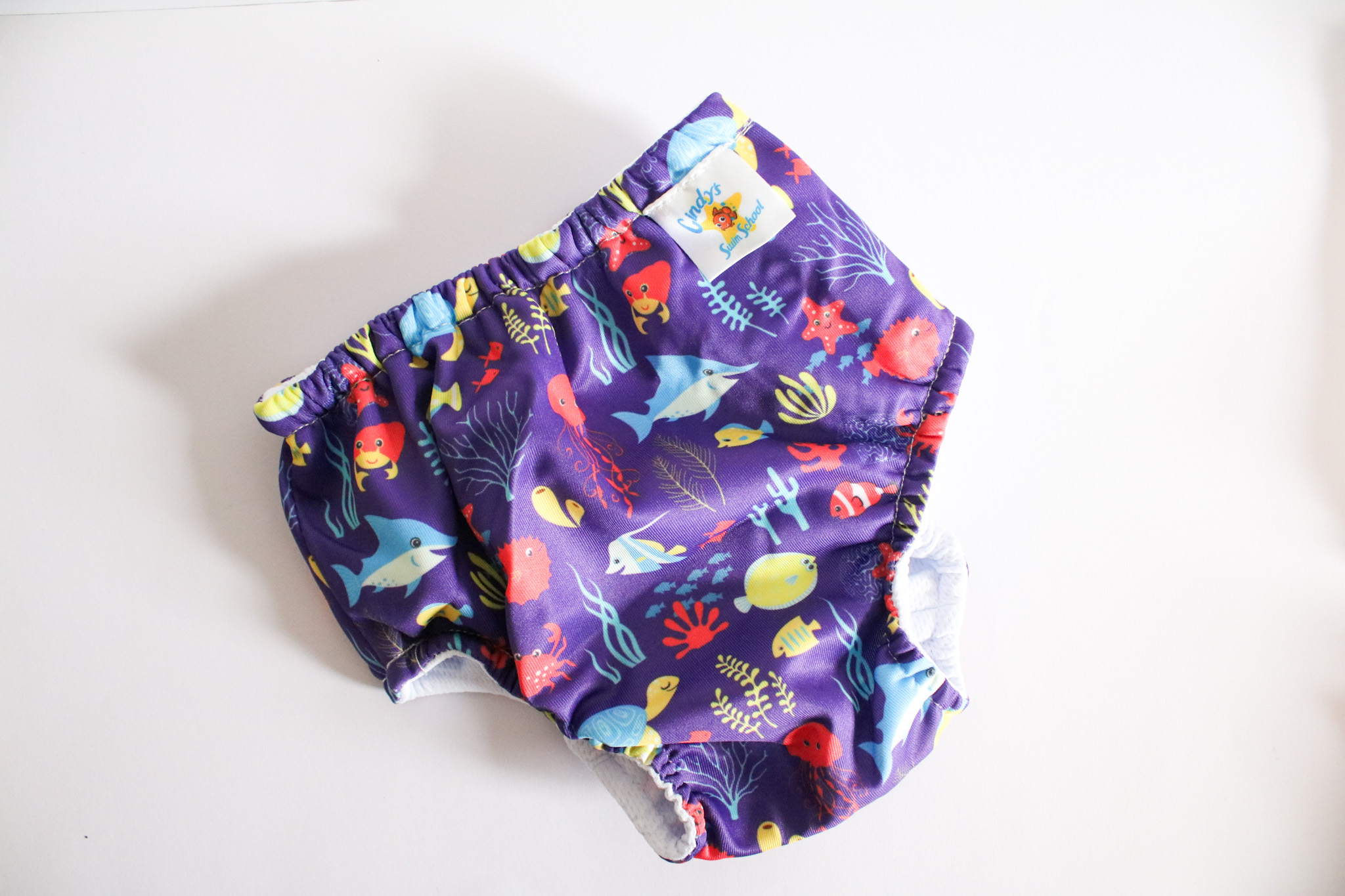
The reuseable water nappy fits comfortably underneath the neoprene water shorts.
£8.99
A Swimsuit
If you know that the pool you are going to runs their air or water temperature a little colder, a swimsuit can help to keep your baby warm by adding a little more insulation.
Comfort for your baby and ease of putting on the swimsuit are both important factors when deciding which swimsuit, if any, is best. Many of our parents just stick to the swim nappy and neoprene, whilst other parents like to add an extra layer. Just make sure that whatever you buy, that it isn’t too restricting for the baby to move their arms and legs, or that it’s too heavy, which can affect buoyancy.
Rash Vest
If your baby has sensitive skin, a rash vest or a full length swim suit can provide an extra layer of protection against chlorine. If you choose to buy a ‘rashy’, make sure that it fits snugly, so as not to affect arm flexibility and movements too much, or to affect buoyancy, as rash vests which are too large can collect too much water, making it harder to move in the water comfortably.
Large Towel with a Hood
Take a large towel with a hood to wrap your baby immediately after swimming and prevent them from getting chilled. These towels will soon become your favourite accessory, as they not only get your baby warm from head to toe in no time, but they also tackle the drying challenge with relative ease.
Baby Towel
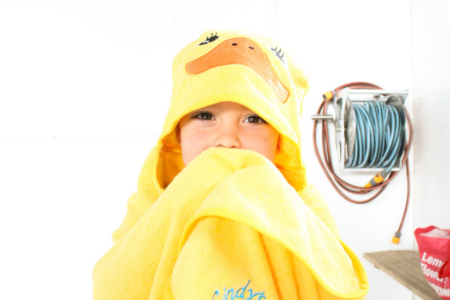
We have a selection of super soft and utterly cute baby wrap and poncho towels in the Cindy Swim School shop.
Choose from an orange fish (wrap),yellow duck (wrap), or a blue dragon (poncho)
£19.99
Should I use a newborn swim float?
No. As your newborn is, well, new, they will be completely dependent on your loving hold, ensuring their safety in the water. A swim float is designed to give older children extra support, once they can hold their own heads up and are consciously trying to move from one place to another in the pool.
At Cindy’s we never use swim floats that attach to the baby or toddler, as we want to teach them what their capabilities are with and without a float, so that our swimmers learn what they can do in the water from day one. Although attachable swim floats can be a great aid in the water when you go on holiday, they are not completely safe, so would always be used with supervision.
How should I hold my baby in the pool?
When holding your newborn in the swimming pool, it’s important to provide support while allowing them to feel secure and comfortable in the water.
Whilst they are learning to hold their heads up unaided, they will be completely reliant on you to keep their heads above water.
What are the Benefits of taking a young baby swimming?
As they have very recently come from being fully submerged in fluid, being in the water should be a very relaxing and happy experience for your newborn. Sharing this warm and fuzzy experience with your newborn has so many benefits, here are a few:
Bonding
Having close skin to skin contact will help you bond with them, in an environment that they are familiar with.
Improve baby's flexibility
Your newborn has been confined to a warm and cosy, but rather cramped environment for the last 10 months. One of the biggest challenges they will face once born, is loosening and lengthening their limbs, so that they can start building muscle and coordination in preparation for those important developmental leaps, such as sitting and crawling. Swimming with your newborn will massively help in this endeavour! At Cindy’s, our baby teachers work alongside your baby’s development, helping you and them every step of the way, by teaching the correct holds, whilst slowly helping them learn to loosen and move their limbs with specific exercises and games. You and your newborn will also learn vital water safety skills from day one, as well as submersion techniques, so that they will be pushing off the mat into the water in no time!
Introduce Water Skills
Swimming is a life skill, and teaching your newborn how to swim will protect them for many years to come, whilst also introducing them to a wonderful life of water fun! It really is NEVER too early to learn, as that is literally what babies are programmed to do – learn! And they do this from day one. So why not teach them something that will save their lives, and has so many incredible benefits! Your newborn could start learning to blow bubbles in as little as three lessons. This is Tau already blowing bubbles in his third lesson in the video below:
Babies really are incredible!! For some examples of young babies learning different foundation exercises, go check out our swimming journey page.
Bathtime bonus
Swimming lessons are your best bathtime helper! By learning how to deal with water in their faces from day one, you should hopefully never have to learn to deal with a very resistant hair washing toddler!
And finally...
What are some Top tips when taking a young baby to their first swimming class?
Whether you are taking your newborn out to the local pool by yourself, or whether you have signed your newborn up to swimming lessons, there are a few things you should get ready before your first swim.
- Make sure you have the swimming nappy and neoprene nappy ready to go
- Have a towel that is big enough to wrap your baby in, head to toe. A hooded towel is perfect
- Ensure that your newborn is not feeling under the weather, you want to have a good fun experience with them on their first swim
- Ensure that your baby is not too tired. They should have a wonderful feed and sleep after their first swim, so best to plan your swim before this
- Feed and burp them no less than 30 minutes before their first swim. A full tummy will help your newborn keep warm, as well as enjoy the experience. Too soon before the swim could lead to them throwing up for the activity
- Have fun and ask questions, baby swimming teachers specialise in teacher parent and baby lessons and have a wealth of knowledge around baby swimming. If you are feeling nervous about your lesson let your teacher know.
Games and Activities for Young Babies
At Cindy’s we have a bunch of songs that we sing every lesson to help you and your newborn to have fun and learn. These include action songs to ‘wheels on the bus’ and ‘twinkle twinkle little star’. As your little swimmer gets older we incorporate additional songs and exercises the use of learn by play is massively important in baby lessons.
Ready to get started? Contact us at Cindy’s today to ask any questions and book your first baby swimming class.
We’ve made it easy for you and put everything you need for baby swimming lessons together in one place with our baby swim kit.
Our parent and baby swim kit bag includes an attractive, sturdy tote bag, a reusable nappy, a neoprene nappy for outer wear, a cute and cuddly animal towel for your baby, and a fun, mould-free floaty toy.
Bundle Save!

